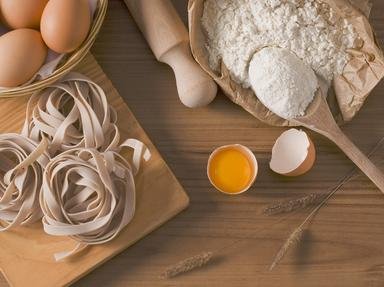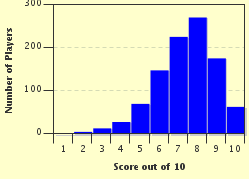Quiz Answer Key and Fun Facts
1. Oscar Wilde once said, "An egg is always an adventure". The word coddle may mean to treat with indulgence or to pamper. How does one coddle an egg?
2. At Passover and on the days immediately following, observant Jews refrain from leaven by eating only unleavened bread. Matzo is the most common example. From a culinary (as opposed to a religious) viewpoint, which of the following are leaveners?
3. William Arthur Ward once said "A pinch of praise is worth a pound of scorn". How much of a dry ingredient would you add if the recipe called for a pinch?
4. Psychologist Richard Carlson wrote a best-selling book entitled "Don't Sweat the Small Stuff". Chef hands you some carrots, celery and onions and tells you she wants you to dice and sweat them. What does she want you to do after cutting them?
5. Entomophagy is the technical term for people eating bugs. People eat all sorts of insects, sometimes even intentionally, but one rarely sees a recipe for cooking butterflies. How does one butterfly a piece of meat?
6. According to the noted American poet and writing teacher Paul Engle (1908-1991), "Writing is like this-you dredge for the poem's meaning the way police dredge for a body." In what can food be dredged before cooking?
7. Workers punch clocks. Boxers punch each other. Chef hands you a large bowl of something and asks you to punch it down. What did she likely give to you?
8. Psalm 30:3b (in the King James Version) says "Thou hast kept me alive, that I should not go down to the pit." Which of the following fruits is NOT pitted?
9. Prices can be steep. Hills can be steep. Places that have been around for a long time may be described as "steeped in history". Which of the following is NOT a purpose of steeping food?
10. Lilliputians are smaller than Brobdingnagians. David was smaller than Goliath. Which of these classic cuts is the smallest?
Source: Author
FatherSteve
This quiz was reviewed by FunTrivia editor
gtho4 before going online.
Any errors found in FunTrivia content are routinely corrected through our feedback system.

